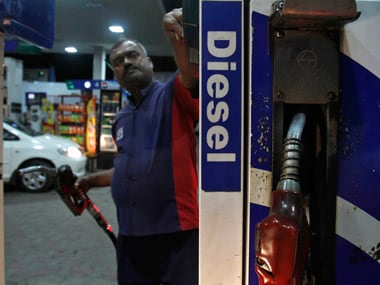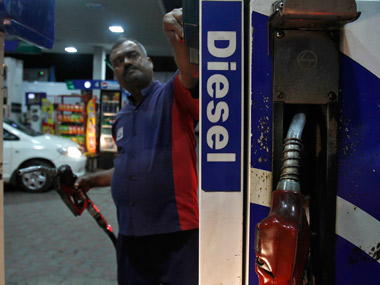Prime Minister Narender Modi brought with him the image of a tough and no-nonsense administrator. This image got a boost when he on 8 November 2016 announced to the awestruck nation demonetisation of 86 percent of currency notes in circulation to call the bluff of black money hoarders. And when on 1 July 2017 when he and his government rolled out the paradigm changing Goods and Services Taxes (GST) regime, there was a grudging admiration even from his detractors. That petroleum products figures in the list of goods and services though not immediately taxed under it showed that here was the government that was really keen on ending the cascading effect of sales tax on the back of excise duty someday in a none too distant a future. It is here that the Modi government has flattered to deceive. Despite more than one year, fuel hasn’t been brought into the GST net. The seemingly hefty reduction announced on 4 October 2018 in petrol and diesel prices by Rs 5 was immediately followed by as many as 14 BJP-ruled states. The Centre’s reduction in excise duty on fuel by Rs 1.50 with a simultaneous diktat to oil marketing companies to absorb a reduction in profit to the tune of Rs 1 per liter has been criticised by and large as succumbing to public pressure. [caption id=“attachment_4222823” align=“alignleft” width=“380”]  Representational image. Reuters.[/caption] The 12 states have taken a reduction in local VAT of Rs 2.50 per liter in both petrol and diesel in their stride, while Maharashtra government reduced prices only on petrol and Jharkhand on diesel. Two things have invited derision – the Center’s own sacrifice of Rs 1.50 and burdening the oil marketing companies with a social objective of guarding the price line to a very limited extent. A 1.50 rupee reduction in the face of about Rs 15 hike over a period of a year, has made the charge of tokenism and buck-passing stick. The Modi government has only itself to blame for painting itself into a corner on fuel taxation. After the recent token sacrifice, it is already complaining that the loss of revenue during the remaining part of the fiscal year would be Rs 10,500 crore and the annualised loss would be Rs 21,000 crore. It has made a fatal mistake of viewing central excise on fuel as the milch cow to finance its welfare schemes. On petrol, as much as Rs 17 per litre is central excise even after the reduction. That indirect taxes account for as much as 50 percent of the petrol bunk prices bolsters the view that both the Centre and states have chosen to burden the common man given the fact that the demand for fuel is inelastic. It is not too late yet. The Modi government must gird its loins to bring fuel under GST. Together the states and the Centre would suffer a hefty 22 percent loss assuming 50 percent tax on fuel to be approximately correct and the GST rate would be the peak rate of 28 percent. It is true that taxes alone are not responsible for the relentless price hike. International oil prices are steadily moving up and to India’s chagrin its currency, the Indian rupee (INR) is being relentlessly mauled by the US dollar in which bulk of the international trade is transacted. While the government is doing well to enter into countertrade or rupee trade with Iran, Venezuela and Russia so as to neutralise the impact of dollar dependency on the oil price hike, it has to do more. Biofuel mix into hydrocarbon up to the optimum level brooks no delay. And coming to the hefty loss of revenue on the back of bringing fuel into the GST net, the government must look elsewhere than the sitting duck—fuel. Disinvestments have virtually ground to a halt. While it is true that disinvestments cannot be a permanent source of finance, it can be at least for five to six years. The caution that family silver should not be sold to pay the butler does not hold when the disinvestment proceeds are used for uplifting the poor from the bottom of the heap. And direct taxes collections are growing at a healthy clip. While indirect taxes are below estimates of Rs 1,00,000 crore per month so far, direct tax collections have been robust. In April-September, gross direct tax collections grew 16.7 percent to Rs 5.47 lakh crore. Indeed, this is the way forward. GST has smoked out a lot of tax evaders who willy-nilly have had to cough up the direct taxes as well. The government must then focus more on direct taxes as using proceeds of fuel taxes, the brunt of which is borne by the poor to finance welfare schemes, is retrograde. The Modi government would cover itself with glory when it announces bringing fuel under GST net simultaneously along with a slew of measures on the direct taxes front—reviving wealth tax and estate duty, the impact of which would be felt by the wealthy alone. It will enhance Modi’s pro-poor image. The Opposition would be constrained not to demur but to go along. (The author is a senior columnist and tweets @smurlidharan)
The government must then focus more on direct taxes as using proceeds of fuel taxes, the brunt of which is borne by the poor to finance welfare schemes, is retrograde.
Advertisement
End of Article


)

)
)
)
)
)
)
)
)



